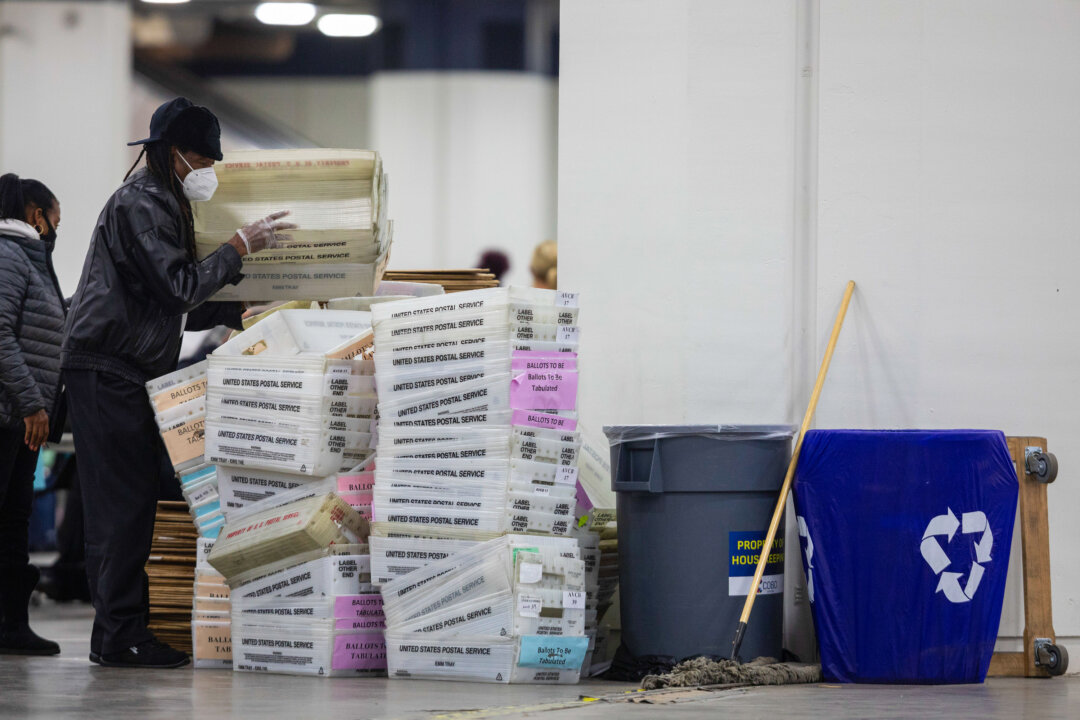The figure is about 200,000 fewer than the same time period four years ago, data show.
With 20 days to go before Election Day on Nov. 5, more than 781,000 ballots have been cast so far in Michigan, according to the top election agency in the battleground state.
As of Oct. 16, 781,534 absentee ballots have been returned across Michigan, according to a tracking tool from the Michigan Department of State. Notably, in Wayne County, which includes Detroit, about 343,000 people have voted absentee so far, representing about 84 percent of the mail-in ballots requested.
Earlier data produced by the Michigan Department of State show that considerably more Michigan residents requested and returned mail-in ballots during the 2020 presidential election.
The Michigan Department of State said in an Oct. 15 statement that 2,133,272 Michigan residents have requested a mail-in ballot. But for 2020, about 2,852,495 residents requested mail-in ballots and 977,694 had returned them with 21 days to go before the election during that year, according to the statement.
The secretary of state’s office noted that the 2020 contest occurred in the midst of the COVID-19 pandemic, which sparked numerous statewide stay-at-home orders and social distancing rules. Voters were also encouraged by the secretary of state’s office to vote by mail over concerns about spreading the virus that causes COVID-19.
Some 31 percent of voters statewide who requested absentee ballots for the election have returned their completed ballots, the Michigan Department of State said in a statement on Oct. 15.
During the 2020 election, about 34 percent of people who requested mail-in ballots had returned them with three weeks to go, the office said.
Polls Show Tight Race
In 2020, election officials in Michigan certified the election for Democratic presidential candidate Joe Biden, who was officially reported to have 2,804,040 votes, over Republican candidate President Donald Trump, who received 2,649,852 votes. Trump, meanwhile, was declared the winner of Michigan in 2016 by a narrow margin of just more than 10,000 votes.
Political forecasters and polls have again signaled that Michigan, with its 15 electoral votes, will again be in play during the Nov. 5 election between Trump and Vice President Kamala Harris.
The state was declared a “toss up” by the Cook Political Report in late August, along with Arizona, Georgia, Nevada, North Carolina, Pennsylvania, and Wisconsin.
Several recent polls show that Trump and Harris are neck-and-neck in Michigan, including a survey from AARP, formerly the American Association of Retired Persons, released on Oct. 15. The two candidates, in that poll, are tied at 46 percent apiece. A previous poll from the group in August showed that Trump had 45 percent and Harris 43 percent.
Last week, a poll from Quinnipiac University showed that Trump took a 3 percent lead in Michigan.
More Campaigning
Trump said in a statement this week that he’ll head back to Detroit, the state’s most populous city and a traditionally Democratic stronghold, on Oct. 18.
His statement, meanwhile, focused on relatively high inflation on groceries, elevated gas prices, and Michigan’s automotive industry.
Harris, meanwhile, visited Detroit on Oct. 15 and was interviewed by political commentator Charlamagne tha God, whose real name is Lenard McKelvey, and was asked numerous questions from his audience.
“This is a margin-of-error race. It’s tight,” she said at one point about the election. “But I’m going to win. I’m going to win.”
And Harris is planning to meet with union workers again in Michigan on Oct. 18. Both the International Association of Firefighters and the International Brotherhood of Teamsters declined to endorse a candidate, with the Teamsters citing a lack of majority support for Harris among its million-plus members.
At a Labor Day rally in Detroit, Harris said that “you better thank a union member” for the five-day work week, for sick and paid leave, and for vacation time. “When union wages go up, everybody’s wages go up,” she said at the time.
Eligible Michigan voters can register to vote, online or via mail, until Oct. 21, and in person at a local clerk’s office, with proof of Michigan residency, on Election Day.
Early polling sites in Michigan haven’t yet opened, but early in-person voting will start on Oct. 26 and will last until Nov. 3. On Election Day, voters can cast ballots from 7 a.m. to 8 p.m. local time.
The Associated Press contributed to this report.

